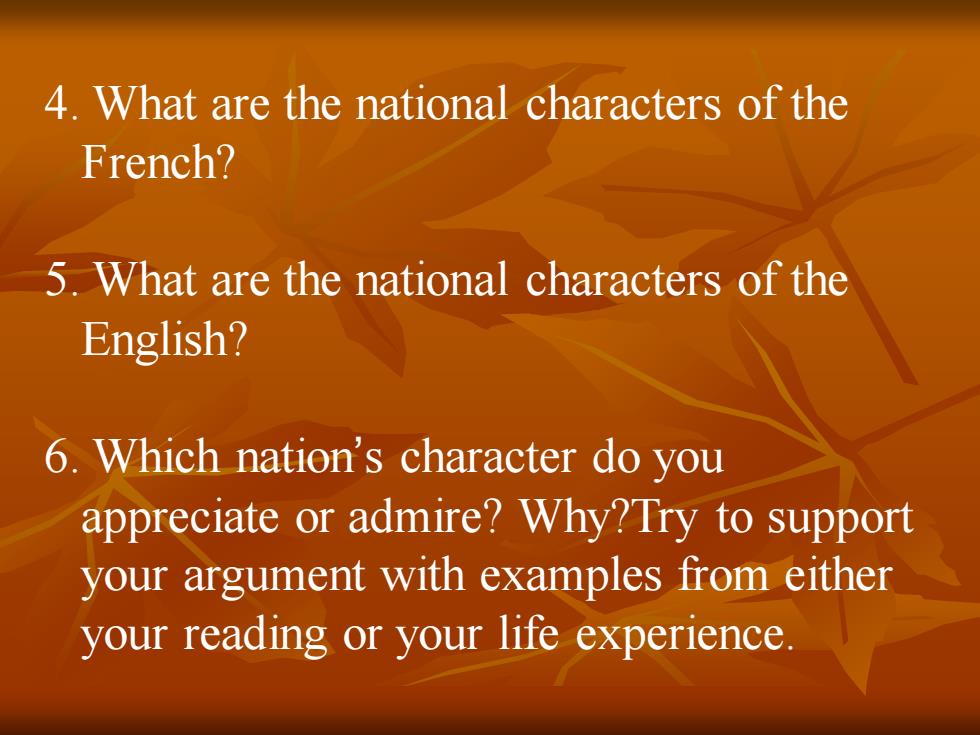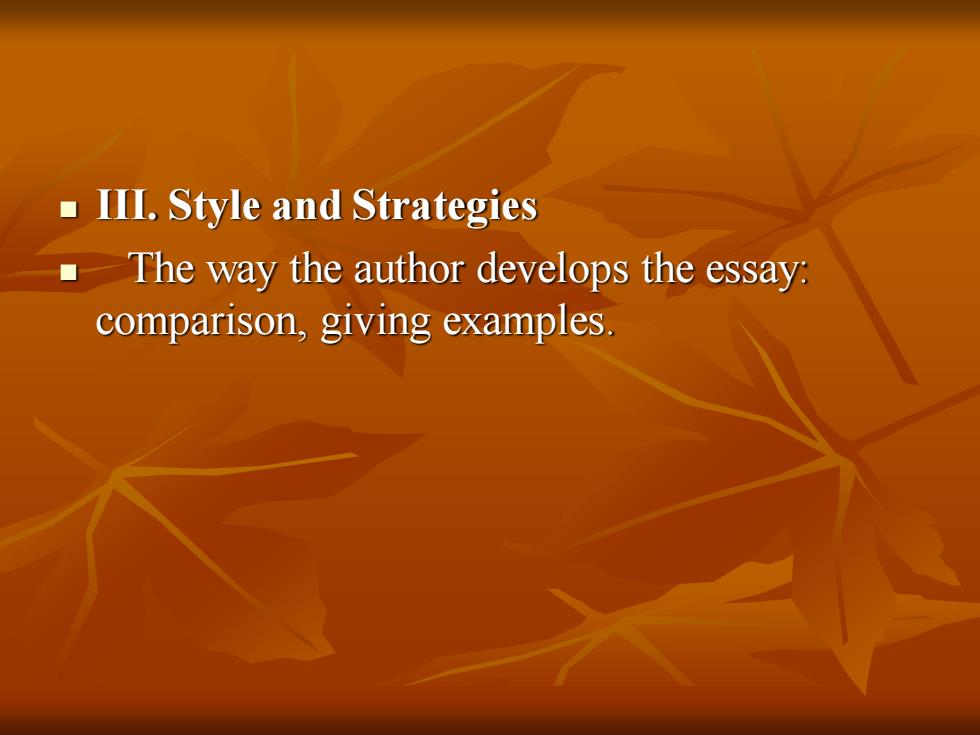
Book 7 Unit 5 Text I
Book 7 Unit 5 TextⅠ

Time Allocation and Teaching Procedure: The 1st two classes: 1.students'presentations 2.teacher's comments and brief introduction to the text I 3.introduction of the author The 2nd two classes:interpretation of text I ■ The 3rd two classes:interpretation of text I; exercises after the text I The 4th two classes:review of text I; interpretation of text II
Time Allocation and Teaching Procedure: ◼ The 1st two classes: ◼ 1. students’ presentations ◼ 2. teacher’s comments and brief introduction to the text I ◼ 3. introduction of the author ◼ The 2nd two classes: interpretation of text I ◼ The 3rd two classes: interpretation of text I; exercises after the text I ◼ The 4th two classes: review of text I; interpretation of text II

Text I:French and English Gilbert Keith Chesterton 18741936 online-literature.com
Text I: French and English

I.Topics for Presentation 1.In what respects are the British people different from the French people?How do they differ from the Chinese people?How do they differ from the Chinese people? 2.How do you think a nation has fostered and formed its distinctive and dominant characteristics? 3.What are the national characters of the Chinese?
I. Topics for Presentation 1.In what respects are the British people different from the French people? How do they differ from the Chinese people? How do they differ from the Chinese people? 2. How do you think a nation has fostered and formed its distinctive and dominant characteristics? 3. What are the national characters of the Chinese?

4.What are the national characters of the French? 5.What are the national characters of the English? 6.Which nation's character do you appreciate or admire?Why?Try to support your argument with examples from either your reading or your life experience
4. What are the national characters of the French? 5. What are the national characters of the English? 6. Which nation’s character do you appreciate or admire? Why?Try to support your argument with examples from either your reading or your life experience

Ⅱ.About the author Gilbert Keith Chesterton (1874-1936)was a prolific English critic and author of verse, essays,novels,and short stories.He is probably best known for his series about the priest-detective Father Brown who appeared in 50 stories.Between 1900 and 1936 Chesterton published some one hundred books. ■ Chesterton was a prolific English writer of the early 20th century.He was both a popular and an influential writer during this period
II. About the author ◼ Gilbert Keith Chesterton (1874-1936) was a prolific English critic and author of verse, essays, novels, and short stories. He is probably best known for his series about the priest-detective Father Brown who appeared in 50 stories. Between 1900 and 1936 Chesterton published some one hundred books. ◼ Chesterton was a prolific English writer of the early 20th century. He was both a popular and an influential writer during this period

inspiring many historic figures with his works. He was notably concerned in what he wrote with religious matters,and was received into the Catholic Church in 1922.Chesterton has been called the "prince of paradox".He wrote in an off-hand,whimsical prose studded with startling formulations.For example:"Thieves respect property.They merely wish the property to become their property that they may more perfectly respect it
◼ inspiring many historic figures with his works. He was notably concerned in what he wrote with religious matters, and was received into the Catholic Church in 1922. Chesterton has been called the "prince of paradox". He wrote in an off-hand, whimsical prose studded with startling formulations. For example: "Thieves respect property. They merely wish the property to become their property that they may more perfectly respect it

III.Style and Strategies The way the author develops the essay: comparison,giving examples
◼ III. Style and Strategies ◼ The way the author develops the essay: comparison, giving examples

IV.Text Explanations If we are to be international we must be national. If we are to truly understand other nations, we must first know what is peculiar with our own nation.If we are ignorant of our own national character,being international can be nothing but a high-sounding slogan
IV. Text Explanations ◼ If we are to be international we must be national. ◼ If we are to truly understand other nations, we must first know what is peculiar with our own nation. If we are ignorant of our own national character, being international can be nothing but a high-sounding slogan

And it is largely because those who call themselves the friends of peace have not dwelt sufficiently on this distinction that they do not impress the bulk of any of the nations to which they belong. Those who claim to be the friends of peace haven't acquired a thorough knowledge about the distinction between different nations,and thus their efforts made in pursuing international peace can bear no fruits even in their own nations
◼ And it is largely because those who call themselves the friends of peace have not dwelt sufficiently on this distinction that they do not impress the bulk of any of the nations to which they belong. ◼ Those who claim to be the friends of peace haven’t acquired a thorough knowledge about the distinction between different nations, and thus their efforts made in pursuing international peace can bear no fruits even in their own nations